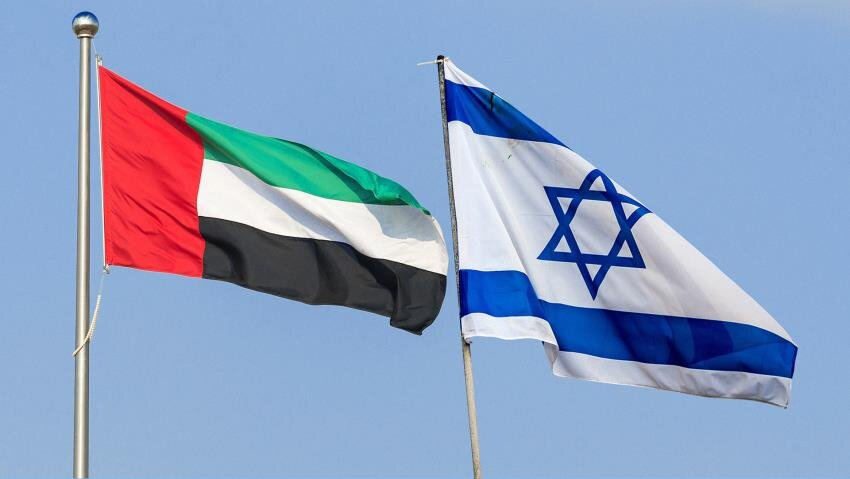Iran warns UAE against an Israeli foothold on its doorstep

U.S. President Donald Trump announced on August 13 that he brokered a “historic deal” between the UAE and Israel to normalize their relations, the first such deal between Israel and an Arab country since 1994. The last time an Arab country signed a deal with Israel to normalize relations was on October 26, 1994, when Jordan signed a peace treaty with Israel.
Under the deal, which is under negotiation, Abu Dhabi and Tel Aviv have committed to the exchange of embassies and ambassadors, and to begin cooperation in a broad range of fields including education, healthcare, trade, and security, according to a statement issued by the White House on Thursday.
Iran condemned the decision by the rulers of the UAE to normalize relations with Israel, calling it a “big mistake.”
“They thought that if they approach the Zionist regime, their security and economy would be ensured, while this is wrong and 100% condemned, and it is a clear betrayal to the Palestinian people, the cause of al-Quds and Muslims,” the presidential website quoted President Hassan Rouhani as saying on Saturday.
“The rulers of the United Arab Emirates should know that they have gone in the wrong direction if they think that they can buy security for themselves by getting closer to the enemies of Islam and Iran,” the president said, warning that “unfortunately, the United Arab Emirates has made a big mistake and we hope it would change its wrong tack. We warn them against giving Israel a foothold in the region, then they will be treated differently.”
In a separate warning to the UAE, Chief of Staff of the Iranian Armed Forces Major General Mohammad Hossein Bagheri announced on Sunday that the UAE bears the responsibility for any harms to the national interest of Iran. He also said that Iran will fundamentally change its approach toward the UAE.
“Definitely, the Iranian nation’s approach towards this neighboring state [the UAE] will change fundamentally, and the Islamic Republic’s Armed Forces will also deal with that country according to different calculations,” the top general warned.
Iran’s warnings center around the possibility that the UAE gives Israel a stronghold on Iran’s doorstep, a move that could further ratchet up tensions between Iran and the UAE. However, analysts told the Tehran Times that the UAE may not be willing to hurt its relations with Iran by doubling down on its efforts to strengthen intelligence or military ties with Israel.
“In the last few days, the Emirates has sought to send messages to Iran through third parties that their deal with Israel isn’t aimed at undermining their relations with Iran,” Mosayeb Naeimi, a West Asia expert, told the Tehran Times. Naeimi said the UAE’s fragile economic and military situation doesn’t allow it to embark on a confrontational policy toward Iran.
According to Naeimi, the UAE economy is heavily dependent on foreign investment and Iranian businessmen play a significant role in the Emirati economy, and that it’s not in the interests of the UAE to antagonize Iran.
The expert also downplayed the implications of the normalization of ties between the UAE and Israel for Iran, underlining that the ties between the two sides have begun more than a decade ago and Iran has been “closely watching” the development of their ties.
“The Emirati move is nothing new, although it was only recently announced. Abu Dhabi has had long-standing ties with Tel Aviv for more than a decade. Israeli Prime Minister Benjamin Netanyahu has visited Abu Dhabi twice. Iran was aware of these ties. Therefore, what has happened now is just an announcement of what was going on in secret,” Naeimi noted.
Samad Qaempanah, a professor of international relations at the Islamic Azad University, agrees with Naeimi that the normalization of ties between Israel and the UAE is not new.
Qaempanah pointed out that the normalization of ties between Israel and Arab countries is part of a process that began after the U.S. invasion of Iraq in 2003 when the idea of what came to be known as “the New Middle East” began to take hold.
He said that Iran is not worried about a potential intelligence or security cooperation between Israel and the UAE because the cooperation has already taken place and that it is not new from Iran’s point of view.
“Israel has already established influence in Iran’s neighbors and in the region. There has been a sort of overt or covert security and intelligence cooperation between these countries and Israel,” the professor said, adding that the Rouhani government criticized the UAE-Israel deal from a security point of view to convey a message that Iran has the upper hand in the region and thus countries like the UAE should accept Iran’s upper hand in the region if they want to avoid problems arising from normalizing their relations with Israel.
Qaempanah also said Iran’s opposition to the normalization deal is grounded in Tehran’s political and ideological agenda, which introduces Iran as a country that seeks to establish the “global government of Islam” as a way to unify “the Islamic Ummah”.
“Therefore, Iran believes that the Emirati move is intended to deliver a blow to the Islamic unity,” Qaempanah told the Tehran Times.
Source: Tehran Times

